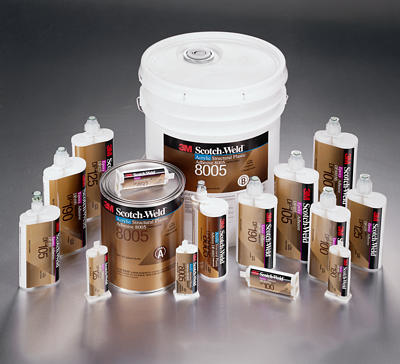An Overview of Epoxy Resins
 Scientifically speaking, epoxy resins are defined as “a family of monomeric or oligomeric materials that can be further reacted to form thermoset polymers possessing a high degree of chemical and solvent resistance, outstanding adhesion to a broad range of substrates, a low order of shrinkage on cure, impact resistance, flexibility, and good electrical properties.” When selecting an epoxy resin, the resin, modifiers, and cross-linking agent can be custom-selected to create specific characteristics for a particular application. This allows epoxy resins to be used in a wide variety of applications.
Scientifically speaking, epoxy resins are defined as “a family of monomeric or oligomeric materials that can be further reacted to form thermoset polymers possessing a high degree of chemical and solvent resistance, outstanding adhesion to a broad range of substrates, a low order of shrinkage on cure, impact resistance, flexibility, and good electrical properties.” When selecting an epoxy resin, the resin, modifiers, and cross-linking agent can be custom-selected to create specific characteristics for a particular application. This allows epoxy resins to be used in a wide variety of applications.
Epoxy Resin Characteristics
Epoxy resins are known for high performance. They are the building blocks for adhesives, coatings, reinforced plastics, and composite materials such as fiberglass and carbon fiber, which remain intact under intense conditions. When properly cured, epoxy resins offer a number of desirable characteristics, including:
- Resistance to chemicals, particularly alkaline environments
- Heat resistance
- Adhesion to a variety of substrates
- High tensile, compression, and bend strengths
- Low shrinkage during curing
- High electrical insulation and retention properties
- Corrosion resistance
- Cures under a wide range of temperatures
- Resistance to fatigue
Epoxy Resin Applications
Typically when the terms “structural adhesive” or “engineering adhesive” are used, they are referencing epoxies. Epoxy resins stick to wood, concrete, metal, glass, stone, and most plastics; making them incredibly versatile. Just a few of the many useful epoxy resin applications include:
- Construction: Laminated wood, walls, roofs, flooring, and more.
- Paints and coatings: Outdoor coatings, sealers, heavy-duty protective coatings, industrial and automotive paints, primers, and sealers.
- Industrial tooling and composites: Molds, master models, laminates, castings, fixtures, and other industrial production aids, as well as carbon-fiber-reinforced and composite parts.
- Turbine technology: Wind turbine blades.
- Electrical systems and electronics: Motors, generators, transformers, gear switches, bushings, insulators, printed wiring boards (PWBs), potting, and semiconductor encapsulants.
- Consumer and marine: You can pick up epoxies in most hardware and marine stores in packs that facilitate the mixing of resin and hardener before use. These kits are useful in many home and boat repair applications.
- Aerospace: In the aerospace industry, among others, epoxy is used as a structural glue that is reinforced with glass, Kevlar, boron, or carbon fiber. This option is particularly used in the aerospace industry because of epoxy resin’s high-performance mechanical properties and resistance to environmental deterioration.
- Biology: Durcopan is a water-soluble epoxy used for embedding electron microscope samples in plastic for sectioning and imaging.
- Art: Epoxy resin can be mixed with pigment for painting, used to make jewelry, or used in decoupage applications for artwork, tables, and countertops.
Selecting Epoxy Resins
When selecting epoxy resins, there are a number of factors to take into consideration, including:
- Use: Will the epoxy be used for a general-purpose or a more industrial application?
- Work-life: How long will you need to work with the epoxy before it sets up?
- Cure time: How long will it take the epoxy to cure and be full-strength before the product can be used?
- Temperature: At what temperature will the part operate at? Is the selected epoxy resin tested to handle temperature extremes if that characteristic is needed?
Working with a reputable retailer will help you determine these factors and others to ensure you select the proper epoxy resin to use for your job.
Since epoxy resins perform well under extreme conditions, when they are combined with carbon or other fibers, they produce composite materials with the properties that are beneficial in many applications. Their unique, high-performance characteristics make them well-suited to work in many environments that offer extreme conditions. The resin, modifier, and cross-linking agent can be switched up to create a custom epoxy that performs under very specific conditions. These properties make epoxy resins the material of choice for a wide variety of applications and conditions.